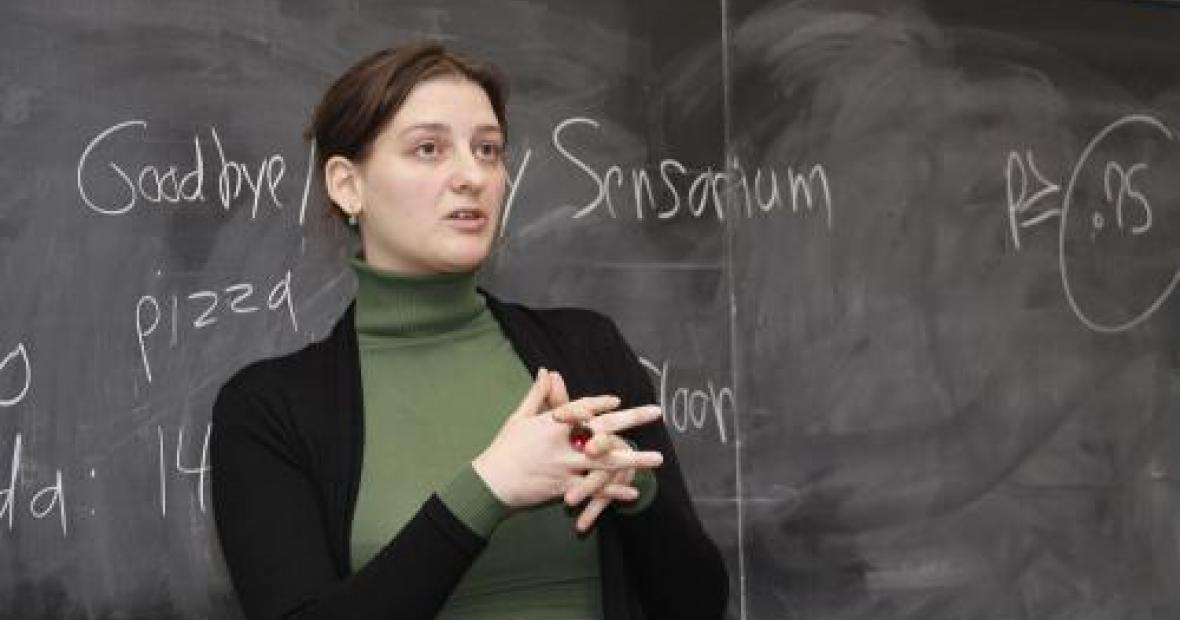Returning “home” to teach about homeland
Funda Soysal ’96
When the 17-year-old Turkish girl came to Grinnell in the mid-‘90s, she could not have imagined that she would return to teach as a Center for International Studies (CIS) fellow among faculty members she so admired.
“It’s a great privilege,” said Funda Soysal ’96, of her recent fellowship and teaching experience in a special topics seminar on “Confluence and Conflict: Turkey as the Cultural Crossroads of Europe and Asia.”
“Why I came to Grinnell in the first place is coming full circle for me now,” Soysal says. The international student from Turkey majored in history and returned to her homeland to pursue a Ph.D. in Ottoman/Turkish history at the prestigious Bogazici University. Throughout her graduate study, she worked at several NGOs but always felt the tug of teaching.
She also kept in touch with Don Smith, professor emeritus of history and Soysal’s senior seminar instructor. Smith visited Soysal in Istanbul in 2001, and as Grinnell connections often work, she was later contacted by David Harrison, director of CIS, to consult with Grinnell faculty who were conducting research for a course on Turkey.
Last summer Soysal led a group of 10 who travelled to Istanbul to prepare for this semester’s course. The faculty members (Mark Montgomery, economics; John Wei, history; Kathy Kamp, anthropology; Jenny Michaels, German; Shawn Womack, theatre; Irene Powell, economics; Tyler Roberts, religious studies; Gemma Sala, political science; John Whittaker, anthropology; and Ellen Mease, theatre) also studied at Bogazici University as part of the faculty development seminar organized by CIS.
“Part of the CIS mission is to connect teachers and scholars,” said Montgomery. “Funda was extremely helpful to us in planning the course. We were pleased to be able to entice her to return this semester, with the help of CIS. It’s been a great collaboration.”
Soysal says the three-week fellowship back on the Grinnell campus also affirmed her own interest in teaching. “This is a big affirmation for me personally. I know now I can do it,” Soysal says. She taught Turkish history in the first module of the three-part humanities and social studies course.
As Soysal leaves, the faculty whom she guided in her homeland are teaching modules about the modern day Turkey they learned about last summer. Student interest in the course has been high, with more than 30 students registered for the initial course.
“Learning is lifelong, and we are learning along with the students,” Montgomery said. “This course is an experimental model for incorporating faculty research and travel into the curriculum. It’s been a great experience in team teaching.”
Soysal too will take learnings from her Grinnell team-teaching experience as she returns to graduate work and teaching in Istanbul. “I will tell my students at home that they should demand to learn more. It was great to feel that kind of pressure from students here. I am very impressed with Grinnell students—how sharp their questions are, how high their high expectations are, and how serious they about their learning. Their answers are so to the point.
“It’s also been a different experience to see faculty as people. I still can see why I thought this place is wonderful though . . . it has changed a lot and yet is so familiar . . . one I know by heart.”
Soysal compliments Grinnell on its vision and commitment to public affairs by choosing to offer a course on Turkey. “I think the questions about Turkey are not easy ones to answer. I was happy to learn that Grinnell offers its students the chance to tackle these questions with the help of such a diverse group of faculty. The students gain a great appreciation for complex issues and to go beyond easy dichotomies,” Soysal concludes.

